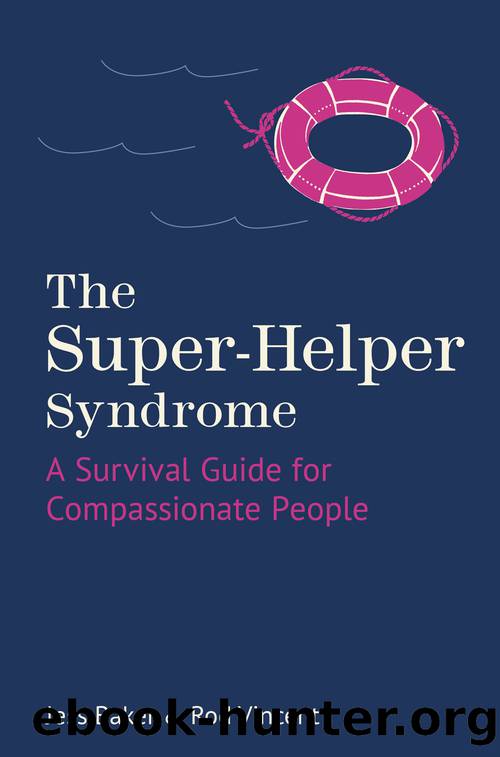The Super-Helper Syndrome by Jess Baker

Author:Jess Baker
Language: eng
Format: epub
Publisher: The History Press
Reason 3: Your Help Isnât Needed â Itâs Not Your Task
When you are a psychologist interviewing people, for the many reasons we do, thereâs something that sometimes happens at the end, after you have finished your questions. People relax out of their I-am-being-interviewed mode into a more informal conversational mode. This can be the moment when they open up or their most colourful examples come to mind. It was as one of those afterthoughts that a nurse told me this story. She was outside the leisure centre chatting to her gym-buddy before getting into her car. Across the car park she caught sight of a lady halfway out of her car seat, struggling with the open door. She was parked in a disabled bay. The nurse raced over and said, âLet me help you.â She hooked her arm under the ladyâs and used her body to gently lift her from the car. The lady didnât say anything until she was almost hauled out. Then she told the nurse she had actually been trying to get in. The nurse said how sorry she was, but the lady didnât seem to mind. Although this was recounted to me as a funny afterthought, it nicely illustrates how your help sometimes isnât needed. It also shows how empathy in overdrive can lead to poor judgements.
In the same way that it was obvious that you donât have the capacity to help everyone, for a variety of reasons, it should also be obvious that sometimes your help is not required. Remember the definition in Chapter 1 â for it to be help, it has to be needed. But again, the instinct to help can kick in before a compulsive helper has even questioned it. Might the person already know where they can find a solution? Might they already be getting help from elsewhere?
A useful concept here is the âseparation of life tasksâ as identified by Alfred Adler in his theory of Individual Psychology. Adler stressed the importance of identifying what is, and what is not, your responsibility. A classic example is when âhelpingâ a child to do their homework. According to Adlerâs idea, itâs the childâs task not the parentâs. Forcing them to study can just lead to frustration and resentment in both the parent and the child. Establishing the separation of tasks would be to make it clear that itâs the childâs responsibility, and why. Then, not to offer more help than the child wants. Adler pointed out that we are constantly trying to take responsibility for how other people behave. When you start to notice this, you are likely to find yourself doing it all the time. When I first moved in with Rod and his son, I found myself picking up wet towels from the bathroom floor. After a while I felt resentful that I was doing this. Then I thought, they must have eventually picked up the towels before I moved in, and nobody had asked me to pick them up. It wasnât my task, so I stopped.
Download
This site does not store any files on its server. We only index and link to content provided by other sites. Please contact the content providers to delete copyright contents if any and email us, we'll remove relevant links or contents immediately.
Should I Stay or Should I Go? by Ramani Durvasula(7662)
The Lost Art of Listening by Michael P. Nichols(7500)
The Rosie Project by Graeme Simsion(6388)
Beartown by Fredrik Backman(5744)
We Need to Talk by Celeste Headlee(5610)
Ego Is the Enemy by Ryan Holiday(5424)
Hunger by Roxane Gay(4923)
Suicide Notes by Michael Thomas Ford(4824)
I Love You But I Don't Trust You by Mira Kirshenbaum(3870)
Mummy Knew by Lisa James(3686)
Not a Diet Book by James Smith(3413)
Crazy Is My Superpower by A.J. Mendez Brooks(3398)
Toxic Parents by Susan Forward(3285)
Girl, Wash Your Face by Rachel Hollis(3282)
The Complete Idiot's Guide to Coping With Difficult People by Arlene Uhl(3146)
The Social Psychology of Inequality by Unknown(3025)
Name Book, The: Over 10,000 Names--Their Meanings, Origins, and Spiritual Significance by Astoria Dorothy(2987)
The Hard Questions by Susan Piver(2967)
The Gaslight Effect by Dr. Robin Stern(2791)
